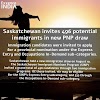The launch of the Express Entry system in January 2015 marked a significant departure from Canada’s previous approach to managing applications to its main Economic Class immigration programs. This approach meant that all candidates were guaranteed to have their applications reviewed, and those that met the requirements received permanent residence — provided they passed an admissibility check (for health, security, and criminality).
Old framework excessively moderate
Despite the way that the primary come, first-served approach offered sureness to up-and-comers who could tick every one of the cases, it also had noteworthy deficiencies.
Applications reliably overshadowed the available invariable living course of action spots, making significant aggregations that reached out into years and left up-and-comers and their families in limbo.
These concedes in like manner left Canada going up against the probability that the people who over the long haul expanded invariable home never again tended to the issues of Canada's work feature. A 44-year-old data analyst may have been looked for after when the individual applied, anyway following six years this may not be the circumstance and, by and by 50, they had a more diminutive window to organize into the work promote.
While it’s early to tell if Express Entry has led to better economic outcomes for immigrants, there is a strong chance that immigrants will in fact fare better due to the way Express Entry awards points.
Candidates who are young, have high levels of education and English and/or French proficiency, and have Canadian experience (e.g., as foreign workers or international students) can achieve a higher CRS.
Moreover, candidates with a job offer or a provincial nomination are awarded additional points (600 for a provincial nomination), as are candidates with siblings in Canada.
All of this makes sense, as federal government research shows candidates with high human capital integrate quickly into the economy, as do those with Canadian experience. Research also shows having a job offer, being nominated by a province, and/or having family in Canada expedites the economic integration process.
Overall, Express Entry’s strengths overshadow its limitations and the system is meeting expectations.
The federal government has also demonstrated policy flexibility since January 2015 by introducing reforms to Express Entry that reflect stakeholder feedback. For instance, the view that Express Entry was not giving enough preference to international students led to changes whereby international students are now awarded up to 30 additional points under the CRS.
These changes are a reminder that, even after five years, Express Entry is a work in progress and the federal government will continue to identify ways to recalibrate and improve it.
Old framework excessively moderate
Despite the way that the primary come, first-served approach offered sureness to up-and-comers who could tick every one of the cases, it also had noteworthy deficiencies.
Applications reliably overshadowed the available invariable living course of action spots, making significant aggregations that reached out into years and left up-and-comers and their families in limbo.
These concedes in like manner left Canada going up against the probability that the people who over the long haul expanded invariable home never again tended to the issues of Canada's work feature. A 44-year-old data analyst may have been looked for after when the individual applied, anyway following six years this may not be the circumstance and, by and by 50, they had a more diminutive window to organize into the work promote.
Stronger labour market integration
While it’s early to tell if Express Entry has led to better economic outcomes for immigrants, there is a strong chance that immigrants will in fact fare better due to the way Express Entry awards points.
Candidates who are young, have high levels of education and English and/or French proficiency, and have Canadian experience (e.g., as foreign workers or international students) can achieve a higher CRS.
Moreover, candidates with a job offer or a provincial nomination are awarded additional points (600 for a provincial nomination), as are candidates with siblings in Canada.
All of this makes sense, as federal government research shows candidates with high human capital integrate quickly into the economy, as do those with Canadian experience. Research also shows having a job offer, being nominated by a province, and/or having family in Canada expedites the economic integration process.
Two-tier system
Express Entry does have its limitations, namely its creation of a two-tier application management system across Canada.Those who apply through Express Entry can obtain permanent residence within six months, while those who apply under other federal programs that are not covered by Express Entry, as well as those who apply to Quebec, must often wait an appreciably longer period.
Express Entry meeting expectations
Overall, Express Entry’s strengths overshadow its limitations and the system is meeting expectations.
The federal government has also demonstrated policy flexibility since January 2015 by introducing reforms to Express Entry that reflect stakeholder feedback. For instance, the view that Express Entry was not giving enough preference to international students led to changes whereby international students are now awarded up to 30 additional points under the CRS.
These changes are a reminder that, even after five years, Express Entry is a work in progress and the federal government will continue to identify ways to recalibrate and improve it.
















0 Comments